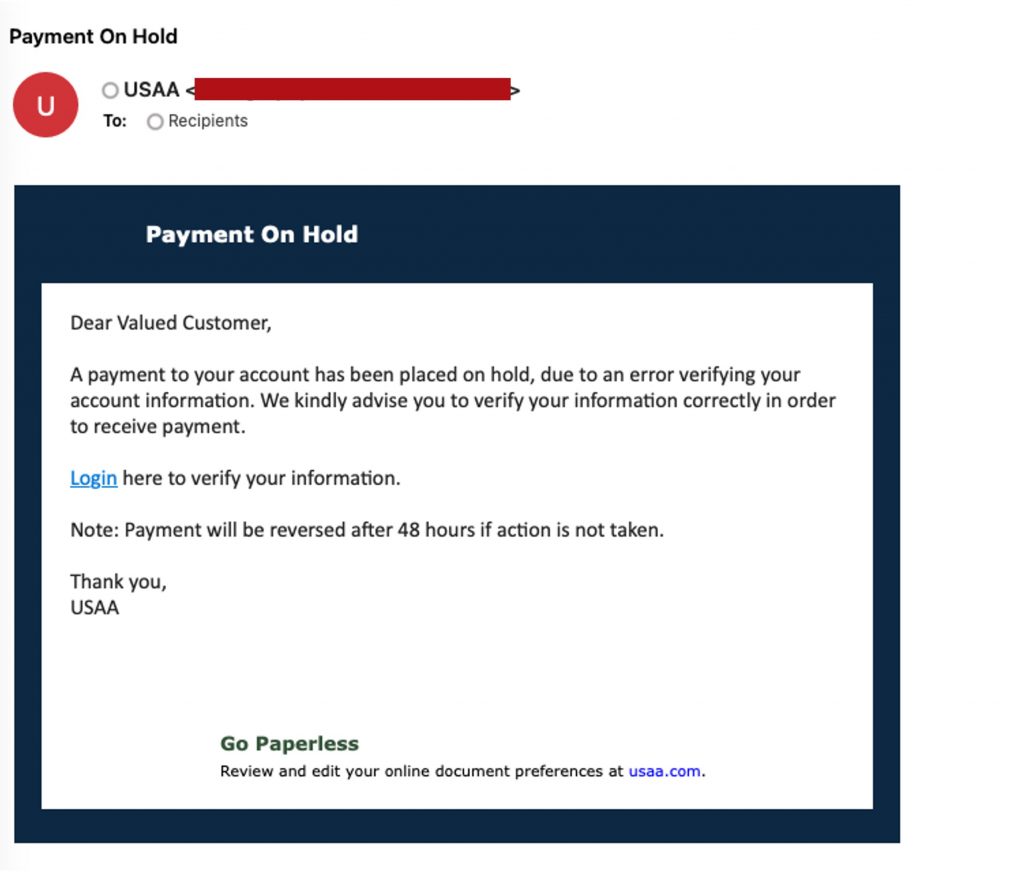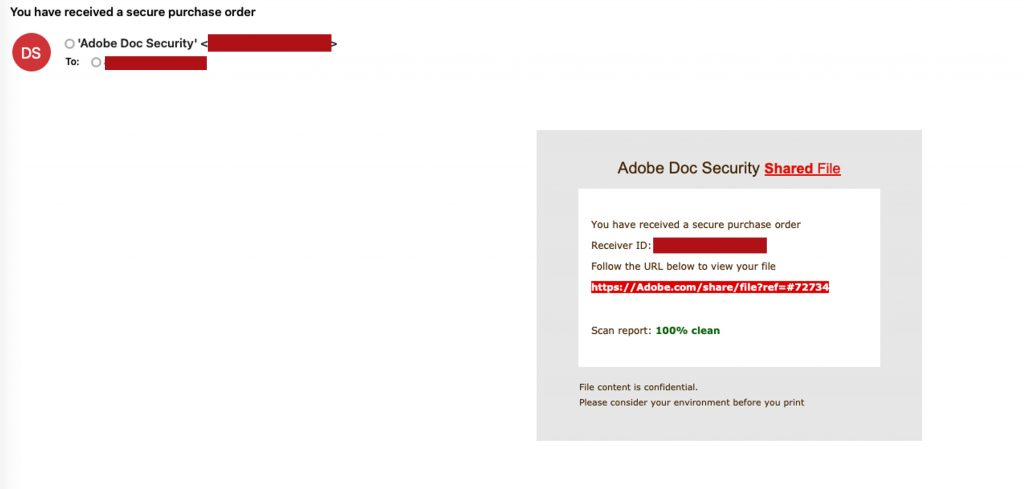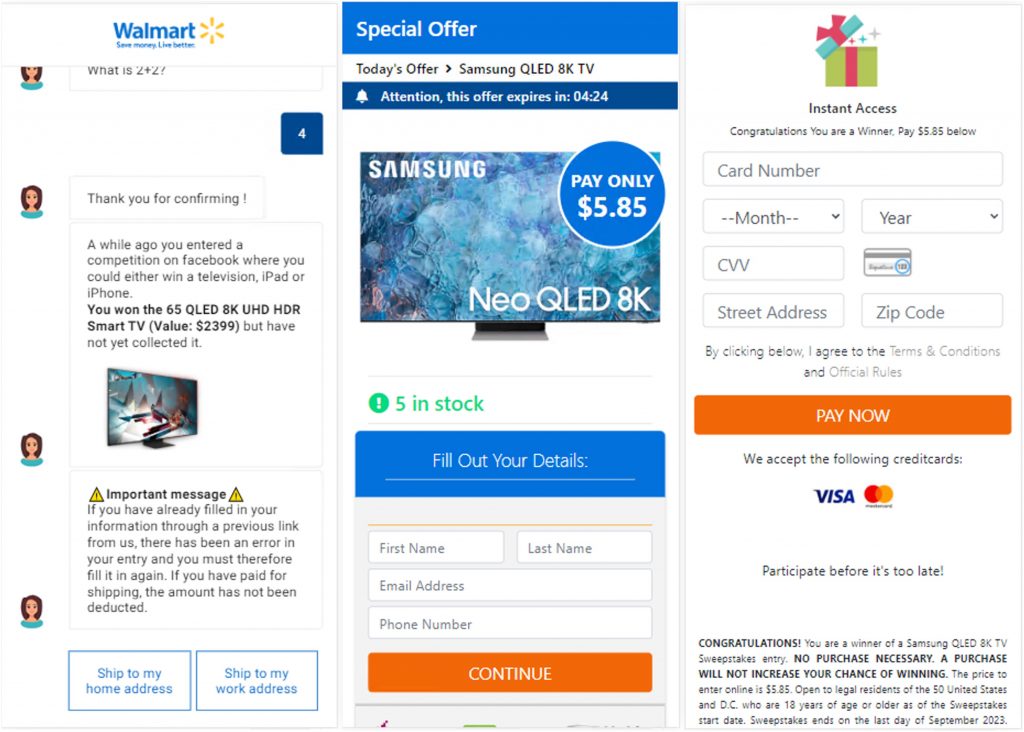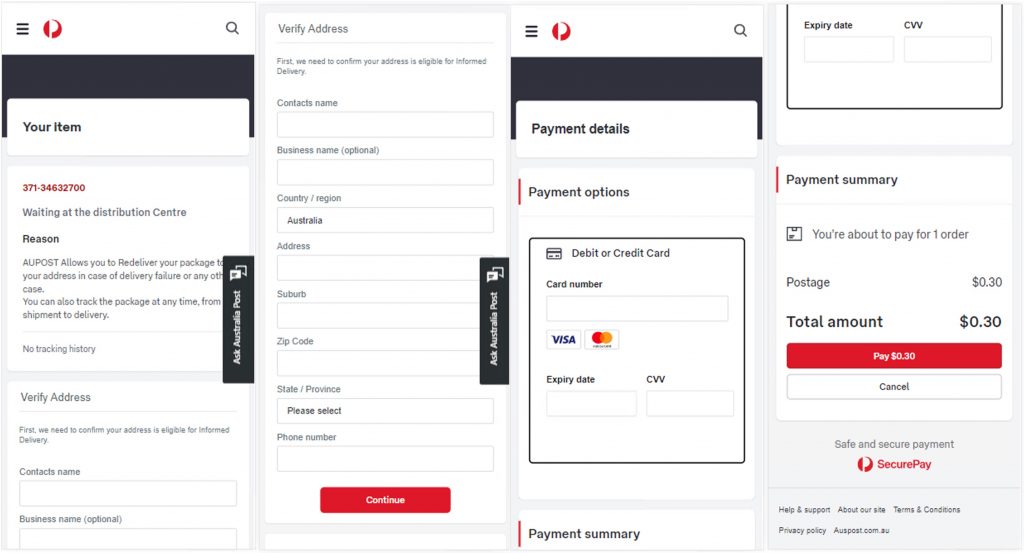This week, we’ve found lots of phishing scams in which scammers are impersonating trusted brands, including Walmart, USAA, and Adobe. Would you have been able to spot all these scams?
Phishing Scams
Impersonating trusted brands, scammers send text messages or emails containing phishing links. They will attempt to make you click them, under various pretenses.
Why? These links will take you to phishing sites designed to record your PII, for example, your email address, credit card number, Social Security number. With credentials like this, scammers can drain your bank account, steal your identity, or commit any number of other crimes. Below are some examples.
Fake USAA Security Alert
One of the most common tactics scammers use is to send fake security alerts and prompt you to verify your account via the attached phishing link. We found lots of fake United Services Automobile Association (USAA) emails that say a payment to your account is on hold and that you need to take urgent action to receive it.

If you fall for it and click on the link, it will take you to a fake USAA website that can collect all the log-in credentials and other personal data that you enter. In this way, scammers can gain control over your USAA account and lock you out. Don’t let them!
[Note: the legitimate web address of the USAA website is usaa.com. If you want to check your account, please go to the official website directly instead of using links from unknown resources!]
Stay Away from Scams for FREE
The truth is, there are lots of scams and scam sites on the internet and they’re getting harder to detect. For an easy and reliable method of detecting and avoiding scam sites, check out our free browser extension (Trend Micro ID Protection) and free mobile app (Trend Micro Check).
Both ID Protection and Trend Micro Check can protect you against scams, phishing links, dangerous websites, and lots more! If you come across something dangerous online, you’ll be alerted in real time so you’ll know to stay well clear
Adobe Phishing Email
Have you received notifications from Adobe that ask you to follow the attached link and view a shared file? Hold on. It could be a scam!

At first glance the attached link may seem genuine. However, its fake web address will point you to a phishing page where you could end up exposing your PII there. Be careful!
[Note: hover on the link to see the full address and check that it corresponds to that of a correct Adobe page — i.e., adobe.com.]
Walmart Gift Scam
We’ve written about fake Walmart text messages many times before. Tricking you into thinking that you’ve won an Apple product, scammers will instruct you to claim your gift via the attached phishing link:
- (Our Walmart competition winner is: Ron. Last day to collect your new apple product: <URL>)
If you do as instructed, you will be led to a fake Walmart online support page that requires you to answer several questions:

In the end, the page asks you to provide your PII, including delivery address, phone number, and credit card details. There’s NO gift, and your PII will end up in scammers’ hands. Watch out!
Fake Shipping Texts
Besides security alerts and free gifts, scammers also love to create fake delivery notifications in order to trick would-be victims. They will falsely claim that there’s been trouble with your package, and prompt you to update your delivery information to get the package:
- Alert: Your package delivery attempt was unsuccessful. To ensure future successful deliveries, kindly update your info here: <URL> Thanks!
Unsurprisingly, the link will take you to a copycat website of the delivery company. Here, as above, you’ll be pressured to submit PII — which will be harvested by the scammers.

Tips to Stay Safe Online
- Double-check the sender’s mobile number and email address. Even if it seems legitimate, think twice before you take any action.
- Never click on dubious links! Only go to official websites and apps to make purchases, update information, or track a package’s status.
- If you’ve accidentally revealed your PII somewhere, change your passwords immediately and inform your bank and/or other companies that scammers may contact them pretending to be you.
- Check if any of your PII has been leaked and secure your social media accounts using Trend Micro ID Protection.
- Finally, add an extra layer of protection to your devices with Trend Micro Maximum Security. Its Web Threat Protection, Ransomware Protection, Anti-phishing, and Anti-spam Protection will help you combat scams and cyberattacks.
If you’ve found this article an interesting and/or helpful read, please SHARE it with friends and family to help keep the online community secure and protected. Also, please consider leaving a comment or LIKE below.
